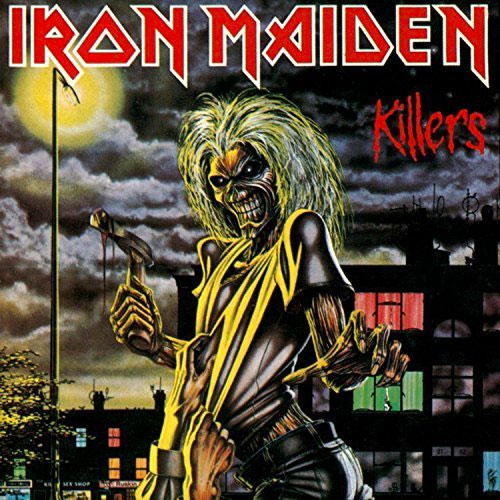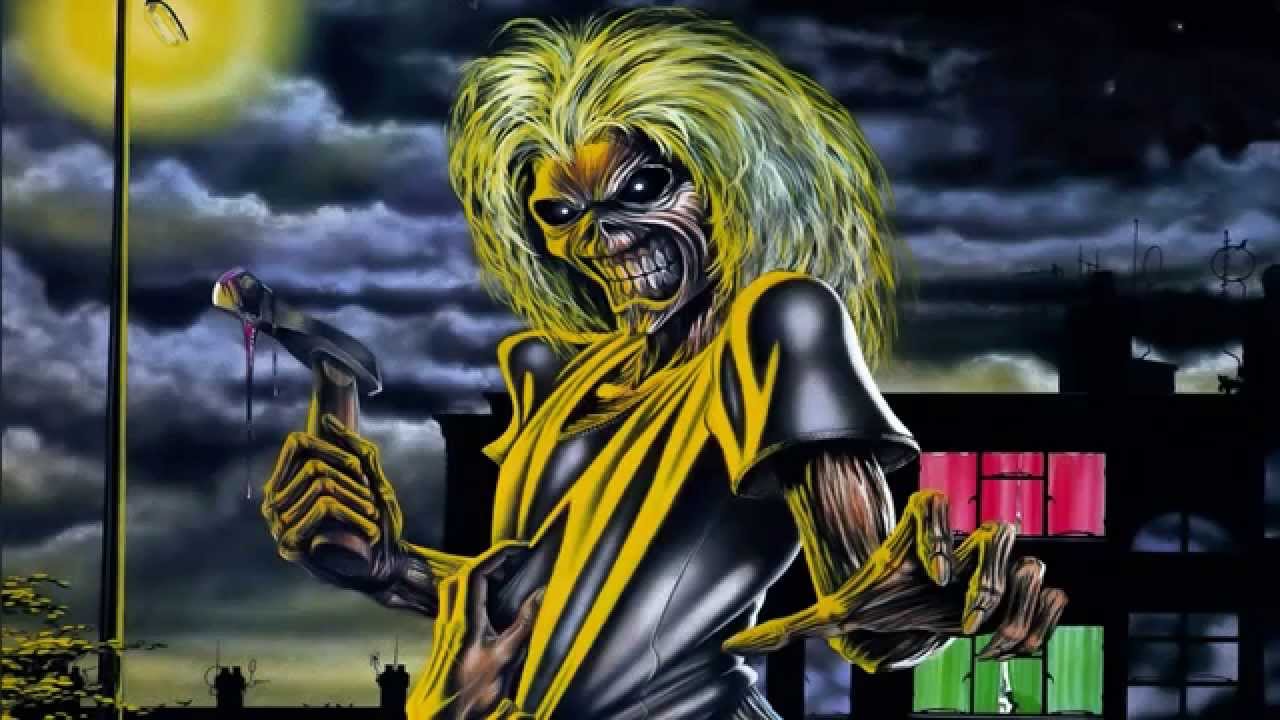
TRACKLISTING
The Ides of March
Wrathchild
Murders in the Rue Morgue
Another Life
Genghis Khan
Innocent Exile
Killers
Prodigal Son
Purgatory
Drifter
Iron Maiden were always ambitious. By the time they got together to record the follow-up to their game-changing debut album, guitarist Dennis Stratton had been sacked for "musical differences".
By Stratton's own account, it was because he was listening to the "wrong music", ending in an argument over Deep Purple's Soldier of Fortune: "I used to listen to things like George Benson, Average White band, Eagles. Loads of Eagles, just relaxing. Little River Band, you know all interesting melodic stuff. And it got to the point we were in one hotel and [manager] Rod [Smallwood] came up and started shouting at me, saying I am not supposed to be listening to this type of music." Later, at the end of a tour with Kiss, said Stratton, "I had Soldier of Fortune on stun volume because I was in the shower. And [Rod] had heard it. And he was saying 'If you are going to keep listening to all this slow soft stuff..." and it just got a bit silly."
So melodic rock lover Stratton was out and Adrian Smith, a childhood friend of Dave Murray who had been fronting his own band, Urchin, was in. The changes didn't stop there either: after Killers, the band traded Di’Anno for Bruce Dickinson, while drummer Clive Burr was shown the door after The Number of the Beast. So where does Killers fit in this ruthless rise to world domination?
Bruce Dickinson has said it's his favourite out of the first two albums ("Killers, in particular, is a favourite of mine. The sound on that album really was the sound that should have been on the first Iron Maiden album") but in some quarters the new slicker sound, courtesy of producer Martin Birch, detracted from the impact of the debut. In fact, Birch had been the band's choice for their debut album - produced by Wil Malone, a mysterious figure who's worked with everyone from Black Sabbath to The Verve, Massive Attack and the Spice Girls - but they had assumed Birch was out of their league. With him on board, and the New Wave Of British Heavy Metal firmly on the rise, there was everything to play for.
Killers was an explosive confirmation of the immense potential the band had shown on their debut, with an even greater sense of momentum and conviction thrown in. Few albums begin with as much haughty braggadocio as this one, as heroic intro The Ides Of March and the pummelling Wrathchild give way to the ridiculously exciting and joyfully metallic Murders In The Rue Morgue. Paul Di’Anno's voice is a thing of raucous wonder throughout his Maiden swan song - they got bigger, and maybe even better, but there's no denying the contribution to the early Maiden sound.
Every week, Album of the Week Club listens to and discusses the album in question, votes on how good it is, and publishes our findings, with the aim of giving people reliable reviews and the wider rock community the chance to contribute. Join the group now.

What they said:
"...The songwriting isn't quite as strong overall as it was on the debut. But the teaming of new guitarist Adrian Smith with Dave Murray forms the most formidable twin-guitar attack in heavy metal, outside of Glenn Tipton and K.K. Downing. Plus, bassist Steve Harris' busy, driving lines are now consistently audible in the mix. The resulting instrumental fireworks are what truly make the album tick. That said, there's a much smaller percentage of catalog standards here than on the previous album." - Allmusic
“Well dodgy, more of a failure than a triumph.” – Sounds

What you said:
Juanjo Ordás: One of the best Maiden albums and, of course, the Di'Anno era masterpiece.
Russ Furmston: Initially I preferred the debut and the following few records. Over time I realised that its that rarest of records: the whole album. There’s nothing that stands out as better than anything else, the whole thing is just brilliant. The sound is incredible, the songs are clever and brilliantly played. It’s a true classic.
James Praesto: Iron Maiden’s covers are iconic, of course, and I wonder if I had been sucked into metal as early as I was if it hadn’t been for their imagery. As an impressionable kid, after picking up Killers and The Number of the Beast, I cover-shopped for years. Meaning, I would just peruse the local record store and buy albums on a whim based on the cover art. Sometimes you struck gold, sometimes you didn’t. We didn’t have today's luxuries of the internet to sample new and unknown bands on, so you had to shop with your gut.
Maxwell Marco Martello: Killers marks the debut of two very important characters in the band’s history: songwriter extraordinaire Adrian Smith (albeit he will be given more space later on) and top notch producer Martin Birch, who not only handled production duties with Deep Purple, Black Sabbath, Rainbow and Whitesnake, but also Iron Maiden’s twin guitar template, Wishbone Ash.
Praise is most definitely well deserved. Although The Ides Of March had already been showcased by Maiden alumnus Thunderstick on Samson’s second LP and although Wrathchild was already known to NWOBHM enthusiasts via the Metal For Muthas compilation, new masterpieces such as the title track, Purgatory and Murders in the Rue Morgue contributed to the album’s greatness.
Brian Carr: Listening to Killers is educational - very raw sounding, but you can still hear elements that will eventually culminate in that classic Maiden sound. DiAnno couldn’t have gotten them there, but still had an interesting voice.
James Praesto: Revered by some, scoffed at by others, Killers was the pinnacle of the Di’Anno era. The band was running out of material, as they had been playing these same songs for years now, but they tweaked the ones they had to complete the album, and with the melodic addition of Adrian Smith, they managed just fine. Personally, I much prefer Killers over their self-titled debut, as I find the songs more cleverly arranged and more suitable to the style they were slowly developing. Steve’s bass drove the songs and the twin guitars of Murray and Smith started to mesh, but more than that, to me, Clive’s drums carried the songs on thunder and poise. Sometimes a bit unheralded, Clive Burr was such an important key to Maiden’s sound in the early days. Without him, the songs could have been a little plodding. He had the punch to make the fast songs sound aggressive. He had the groove to make the simple riffs sound interesting. He had the skill to make the slower numbers ambient and still make the music move forward without falling over. He was my first musical hero, and even though I also liked Nicko, Clive introduced me to the world of sacred timekeeping and how to elevate a song with a beat.
Pekka Turunen: This rounds out my Bottom 5 of Iron Maiden albums along with the 90s output. Might even beat some of them for Bottom 3. The best tracks are brilliant, Killers, Wrathchild and Murders In The Rue Morgue chief among them, but the rest of the album is "just" good and enjoyable, mostly. Another Life is perhaps my least favourite Maiden track, it's just plain unfinished with the same verse repeating three times. Innocent Exile and Drifter are in the bottom of the pile as well.
James Praesto: The songs themselves on Killers are fascinating. They showcase the promise the band later fulfilled on The Number Of The Beast. The unique sound of Maiden lies in the songwriting (obviously), and on this album, the bare bones of the mighty Maiden is on prominent display. The songs were almost exclusively written on bass, with Steve crafting the riffs and music as one-note-played-at-a-time sequences over a solid beat. Then Smith and Murray would flesh it out a bit, but still pretty much staying within that framework. This is why, when you play most of Maiden’s songs on your guitar, they play as melody lines rather than as a progression of chords. It was a huge departure from the standard blueprint of rock, as set down by hordes of guitarists and their blues-based chord patterns. It allowed the band to get progressive within those lines, and to add textures with actual chords where needed. Later on, when they added odd meters (like the 5/4 on The Number Of The Beast), the songs sounded deceptively simple, but proved a challenge for most young musicians striving to emulate their style.
On Killers, the songs are still fairly straightforward, but the progressive element is ever lurking. After the stomping opener of Wrathchild (following The Ides of March intro), Murders In The Rue Morgue gives us a taste of that perfect Maiden-esque bass/guitar combo, with a pummeling beat and soaring solos. The instrumental Genghis Khan is the perfect example of how important Clive’s drumming was to Maiden in these days. His accentuations and drive carry this pretty boring number and saves it from being a filler. However, any long time Maiden fan can dissect this track and find passages they will recognize in other songs of theirs. Bits of melodies, structures and themes come back on albums much later in their career. I feel that as anonymous as this track is to most, it was the band finally exploring what Maiden could be one day, playing around with that sound that would absolutely set them apart from all other metal bands.
Robert Dunn: Two things struck me while listening to this - the first was how astonishingly good Clive Burr was, the second was more of a nagging feeling that Iron Maiden have been phenomenally successful by remaking this album several times since Bruce Bruce (as he was known in Samson) and Nicko McBrain from Trust took over. Sure the songs are powerful and well played, but listen to everything from Number Of The Beast onwards and you will hear bits of this album. A true rock classic from a classic metal band.
James Praesto: I don’t think you can properly talk about this album without mentioning how Steve’s bass defines the sound. I mean, what other rock albums do you own where the bass lines are more recognisable than any other parts of the music? How many metal albums do you own where you can hum all the bass lines from memory? Interestingly enough (and probably only interesting to nerds such as I), I find Steve’s technique to be better on these early albums than on later albums. He had yet to start the full on gallops and kept his bass-playing simple but exciting. Later on, he would add his clacking triplets to pretty much everything, and often dropping the beat in the process. On the first three albums, however, he is solid as a rock. Listen to Killers or Prodigal Son. They are master classes in metal bass playing.
Gary Claydon: I'm another who prefers the debut album, in fact it remains my favourite Maiden album. It's well documented what Steve Harris thought of the production of the first album, but that was the Maiden I liked best, raw, exciting. I must admit my initial impression of Killers was one of slight disappointment. It took me a few listens to fully appreciate it's qualities. With hindsight, the slightly more melodic song writing and the more polished production make it clear to see where Maiden were headed (and just to clarify, I also love where Maiden went from there). Killers was the bridge that led to the metal behemoth the band would become. One of best heavy metal bands ever (the best in many people's eyes). Oh, and it would be wrong to finish without mentioning the cover art, one of the most iconic HM album covers of all time.
James Praesto: Also, with Eddie, Killers created more than a musical milestone in the NWOBHM – the band created a whole new brand of culture around the music itself. Kiss and Motorhead had already introduced the world to characters and mascots, but Eddie came fully alive on this album and became a trademark for a band that was making its way to the forefront of the metal scene. I remember seeing a patch of the Killers album on the back of a guy’s denim jacket, and thinking, “Whoa! What is that? I want that!" Eddie won me over, before I had ever heard a note from the band, and, in 1982, on my 10th birthday, I bought The Number Of The Beast, as my first metal album ever.
Eddie was an important part of the Maiden universe, and sometimes as much part of the album release as the music. Eddie artist Derek Riggs did more for Maiden’s career in the beginning than they probably would like to give him credit for. I am not saying they wouldn’t have made it without his contributions – far from it – but they managed to create the perfect storm with his artwork, their place in time in the emerging NWOBHM, with Martin Birch’s perfect production and with Steve’s bass-centered songwriting.
Killers was not their best album, but it was the stepping stone to perhaps the best run the world of metal will ever see, with the five albums that followed (six, if you count Live After Death – and why wouldn’t you?).
Up the Irons.

Final Score: 7.79⁄10 (265 votes cast, with a total score of 2065)
Join the Album Of The Week Club on Facebook to join in. The history of rock, one album at a time.

